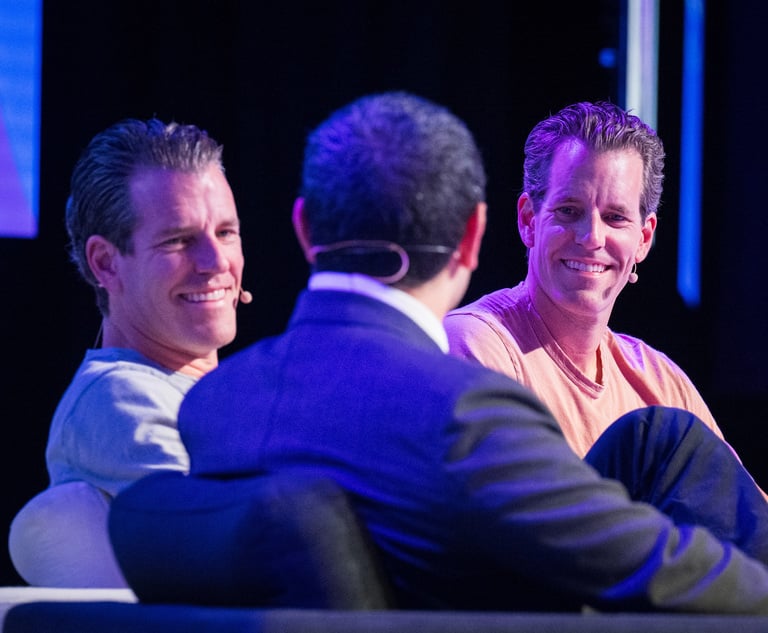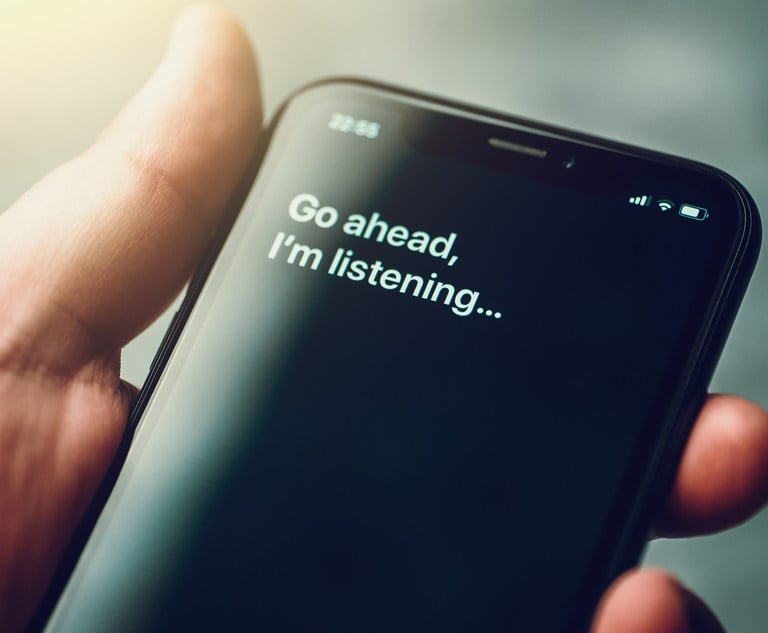 YouTube logo. Photo: Jason Doiy/ALM
YouTube logo. Photo: Jason Doiy/ALMAfrican-American YouTubers Sue Claiming Discrimination, Take Aim at Section 230 Protections
The lawsuit filed on behalf of four African American women claims YouTube has improperly restricted and demonetized their videos based on race, and based on tags such as "Racial Profiling," "Police Shootings," "Police Brutality" and "Black Lives Matter."
June 17, 2020 at 12:33 PM
4 minute read
YouTube was hit with a federal lawsuit Tuesday claiming that the company illegally discriminates against African American content creators.
The lawsuit, brought on behalf of YouTubers Kimberly Carleste Newman, Lisa Cabrera, Catherine Jones and Denotra Nicole Lewis, accuses the company of misapplying its restricted mode to videos whose titles or tags included phrases such as "Racial Profiling," "Police Shootings," "Police Brutality" and "Black Lives Matter."
 "Defendants continue to knowingly, intentionally, and systematically block, demonetize, and deny Plaintiffs and other persons similarly situated, their contractual and other legal rights to access YouTube based on the color of their skin or other protected racial traits, rather than the material in their videos," wrote the plaintiffs lawyers at Browne George Ross in a sprawling 103-page complaint, with more than 120 pages of exhibits.
"Defendants continue to knowingly, intentionally, and systematically block, demonetize, and deny Plaintiffs and other persons similarly situated, their contractual and other legal rights to access YouTube based on the color of their skin or other protected racial traits, rather than the material in their videos," wrote the plaintiffs lawyers at Browne George Ross in a sprawling 103-page complaint, with more than 120 pages of exhibits.
The law firm previously unsuccessfully sued YouTube and Google in 2017 on behalf of Prager University, a nonprofit digital media outfit co-founded by conservative commentator Dennis Prager, claiming that the companies discriminated against videos that offer conservative commentary on current and historical events. Last year, the firm filed suit on behalf of eight LGBTQ+ YouTube creators claiming that content they've uploaded was restricted and demonetized because their video has been deemed by the site's algorithms and moderators as "shocking," "inappropriate," "offensive" or "sexually explicit."
YouTube representatives didn't immediately respond to messages seeking comment Wednesday.
Tuesday's complaint squarely takes aim at Section 230 of the Communications Decency Act, the federal law that immunizes interactive services such as YouTube from being treated as the publisher or speaker of hosted content created by third parties, or from liability for removing or restricting access to certain types of offensive material. The George Browne Ross lawyers contend that YouTube's lawyers conceded at oral argument on their motion to dismiss the LGBTQ+ plaintiffs' case earlier this month, which is pending before U.S. Magistrate Judge Virginia Demarchi of the Northern District of California, that Section 230 may not protect an internet service provider in a case involving intentional race discrimination.
In the LGBTQ+ case, lawyers from the U.S. Department of Justice intervened to defend the Constitutionality of Section 230, arguing that the statute doesn't violate the First Amendment's Speech Clause since YouTube is not a state actor capable of denying the freedom of speech.
In Tuesday's complaint, the plaintiffs lawyers argued that the Justice Department should be foreclosed from making that argument in the latest case, especially in light of the Executive Order issued by President Donald Trump last month, which purported to roll back some Section 230 protections for companies that engage in intentional discrimination based on race, sex or other identity or viewpoint.
"At this time, United States has a potentially unwaivable conflict of interest under the applicable law and ethics rules governing conflicts of interest and divided duty of loyalty," the plaintiffs lawyers wrote in Tuesday's complaint. "If given full legal affect, the Executive Order mandates the obvious: Section 230(c) applies only to filtering and blocking 'offensive material,' not the persons who use the internet," they wrote.
Browne George Ross' Peter Obstler, who led the cases for PragerU and the LGBTQ+ plaintiffs and signed Tuesdays' complaint, didn't immediately respond to a message Wednesday morning.
Read more:
 Sign up for Law.com's Legal Radar to keep up with the latest news and lawsuits in a free, personalized news feed. Track class actions and who's getting the work by industry, practice area, law firm, company and region.
Sign up for Law.com's Legal Radar to keep up with the latest news and lawsuits in a free, personalized news feed. Track class actions and who's getting the work by industry, practice area, law firm, company and region.
This content has been archived. It is available through our partners, LexisNexis® and Bloomberg Law.
To view this content, please continue to their sites.
Not a Lexis Subscriber?
Subscribe Now
Not a Bloomberg Law Subscriber?
Subscribe Now
NOT FOR REPRINT
© 2025 ALM Global, LLC, All Rights Reserved. Request academic re-use from www.copyright.com. All other uses, submit a request to [email protected]. For more information visit Asset & Logo Licensing.
You Might Like
View All
‘Not a Regulatory Gray Area’: CFTC Secures $5M Settlement From Gemini
3 minute read
Apple Agrees to Pay $95 Million Settlement in Siri Voice Assistant Privacy Class Action

Anthropic Agrees to 'Guardrails' for Its AI Training to Protect Copyrighted Lyrics Pending Fight Over Fair Use
5 minute read
'Erroneous Assumption'?: Apple Challenges DOJ Antitrust Remedy in Google Search Monopoly Case
3 minute readLaw Firms Mentioned
Trending Stories
- 1The Appropriate Exemption in Students for Fair Admissions v. President & Fellows of Harvard College
- 2DOJ, 10 State AGs File Amended Antitrust Complaint Against RealPage and Big Landlords
- 3New Partners at Cummings & Lockwood, Carmody Torrance Sandak & Hennessey
- 4'Extra Government'?: NY Top Court Eyes Ethics Commission's Constitutionality
- 5South Texas College of Law Houston Selects New Dean
Who Got The Work
Michael G. Bongiorno, Andrew Scott Dulberg and Elizabeth E. Driscoll from Wilmer Cutler Pickering Hale and Dorr have stepped in to represent Symbotic Inc., an A.I.-enabled technology platform that focuses on increasing supply chain efficiency, and other defendants in a pending shareholder derivative lawsuit. The case, filed Oct. 2 in Massachusetts District Court by the Brown Law Firm on behalf of Stephen Austen, accuses certain officers and directors of misleading investors in regard to Symbotic's potential for margin growth by failing to disclose that the company was not equipped to timely deploy its systems or manage expenses through project delays. The case, assigned to U.S. District Judge Nathaniel M. Gorton, is 1:24-cv-12522, Austen v. Cohen et al.
Who Got The Work
Edmund Polubinski and Marie Killmond of Davis Polk & Wardwell have entered appearances for data platform software development company MongoDB and other defendants in a pending shareholder derivative lawsuit. The action, filed Oct. 7 in New York Southern District Court by the Brown Law Firm, accuses the company's directors and/or officers of falsely expressing confidence in the company’s restructuring of its sales incentive plan and downplaying the severity of decreases in its upfront commitments. The case is 1:24-cv-07594, Roy v. Ittycheria et al.
Who Got The Work
Amy O. Bruchs and Kurt F. Ellison of Michael Best & Friedrich have entered appearances for Epic Systems Corp. in a pending employment discrimination lawsuit. The suit was filed Sept. 7 in Wisconsin Western District Court by Levine Eisberner LLC and Siri & Glimstad on behalf of a project manager who claims that he was wrongfully terminated after applying for a religious exemption to the defendant's COVID-19 vaccine mandate. The case, assigned to U.S. Magistrate Judge Anita Marie Boor, is 3:24-cv-00630, Secker, Nathan v. Epic Systems Corporation.
Who Got The Work
David X. Sullivan, Thomas J. Finn and Gregory A. Hall from McCarter & English have entered appearances for Sunrun Installation Services in a pending civil rights lawsuit. The complaint was filed Sept. 4 in Connecticut District Court by attorney Robert M. Berke on behalf of former employee George Edward Steins, who was arrested and charged with employing an unregistered home improvement salesperson. The complaint alleges that had Sunrun informed the Connecticut Department of Consumer Protection that the plaintiff's employment had ended in 2017 and that he no longer held Sunrun's home improvement contractor license, he would not have been hit with charges, which were dismissed in May 2024. The case, assigned to U.S. District Judge Jeffrey A. Meyer, is 3:24-cv-01423, Steins v. Sunrun, Inc. et al.
Who Got The Work
Greenberg Traurig shareholder Joshua L. Raskin has entered an appearance for boohoo.com UK Ltd. in a pending patent infringement lawsuit. The suit, filed Sept. 3 in Texas Eastern District Court by Rozier Hardt McDonough on behalf of Alto Dynamics, asserts five patents related to an online shopping platform. The case, assigned to U.S. District Judge Rodney Gilstrap, is 2:24-cv-00719, Alto Dynamics, LLC v. boohoo.com UK Limited.
Featured Firms
Law Offices of Gary Martin Hays & Associates, P.C.
(470) 294-1674
Law Offices of Mark E. Salomone
(857) 444-6468
Smith & Hassler
(713) 739-1250






